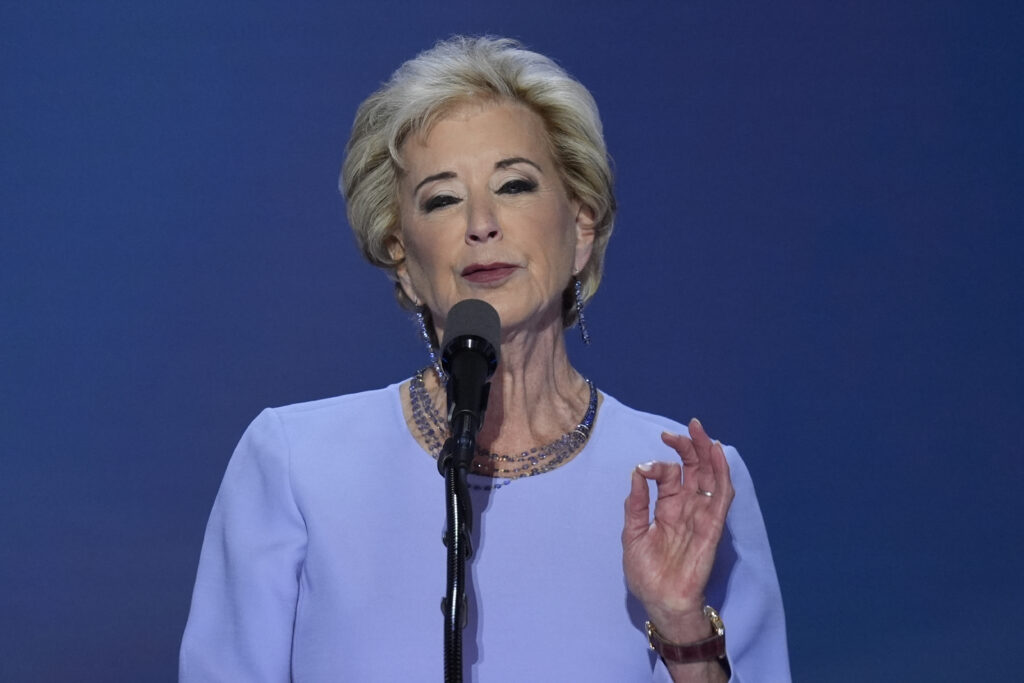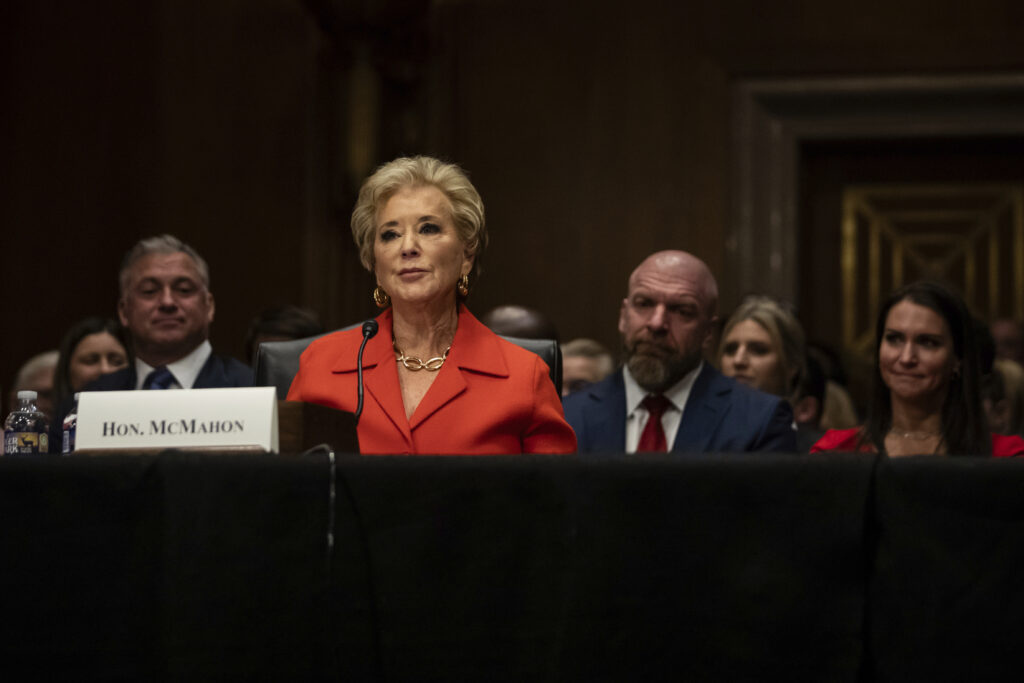
Linda McMahon, former administrator of Small Business Administration, speaking during the Republican National Convention on July 18, 2024, in Milwaukee.
Credit: AP Photo/J. Scott Applewhite
President-elect Donald Trump’s selection of a close ally and the co-chair of his transition team indicates that education could be a major priority of his administration, even though it did not feature prominently in the 2024 presidential campaign.
Linda McMahon, the former CEO of World Wrestling Entertainment, is a leading financial backer Trump has been close to for decades. She is also chair of the board of the little known America First Policy Institute, sometimes referred to as a “shadow transition operation” or “White House in waiting.”
The institute has issued a detailed education policy agenda that is likely to serve as a guide for McMahon, and the Trump administration in general, should she be confirmed by the U.S. Senate.
For those reading the political tea leaves, it was notable that in nominating McMahon, Trump did not explicitly charge her with shutting down the U.S. Department of Education, and that the agenda of the America First Policy Institute does not call for it either. Instead, Trump called on her “to spearhead efforts to send education back to the states” an expansive and undefined charge, especially because by law education is already mostly a state and local function.
Regardless of the fate of the department, the contrast between President Joe Biden’s and Trump’s education agendas — and between McMahon and current Secretary of Education Miguel Cardona — could not be wider.
Cardona is a lifelong educator, becoming secretary after a career as a teacher, principal, district administrator, and state commissioner of education. McMahon spent most of her career building the WWE, founded with her husband, Vince McMahon.
Cardona’s net worth is estimated by Forbes magazine to be $1 million, most of it tied up in his principal residence, retirement savings, and a 529 college savings account for his children. By contrast, Forbes places McMahon and her husband’s net worth at $2.5 billion.
The only thing they seem to have in common is that they are both from Connecticut.
But even though McMahon has a slim resume regarding education, she is not entirely an education neophyte. She studied to become a French teacher in college. She has been a trustee of Sacred Heart College, a Catholic college in Fairfield, Connecticut, for years. She was appointed to the Connecticut State Board of Education in 2009, although she left after a year to run for the U.S. Senate in 2010 and again in 2012 — both times unsuccessfully.
McMahon is more of a traditional conservative Republican than several of Trump’s other Cabinet nominees. In some ways, she is more similar to Betsy DeVos, another billionaire, who was Trump’s first secretary of education. But unlike DeVos, she has had experience in government, as head of the Small Business Administration during Trump’s first term.
In 2019, she left that post, not under a cloud or fleeing vitriol from Trump like many others in his administration, to head the America First PAC, which raised funds for Trump’s re-election bid in 2020.
On the explosive issue of “school choice,” publicly, at least, she has mostly called for expanding charter schools, rather than taxpayer-funded vouchers. “I am an advocate for choice through charter schools,” she declared in her 2010 campaign for Senate.
She also has some bipartisan instincts, even getting support from the Democratic senators she had previously run against, when they had to approve her nomination to head the Small Business Administration. Sen. Richard Blumenthal called her “a person of serious accomplishment and ability,” and Sen. Chris Murphy described her as a “talented and experienced businessperson.”
As SBA administrator, she drew high praise from some Democrats for increasing loans to women-owned businesses, and for making the agency more efficient, including from then-Sen. Ben Cardin, D-Md., the ranking member of the Small Business and Entrepreneur Committee.
Another sign of her bipartisan inclinations came in a September commentary in The Hill newspaper, when she argued for a radical revision of the Pell Grant, the main form of federal student financial aid.
While most Pell grants go to full-time students, McMahon argued that the grant should also be available to students enrolled in “high-quality, shorter-term, industry-aligned education programs that could lead to immediate employment in well-paying jobs.”
To that end, she endorsed a bill known as the Workforce Pell Act, sponsored by lawmakers usually on far opposite sides of the political aisle — Rep. Virginia Foxx, R-N.C., and Rep. Elise Stefanik, R-N.Y., Rep. Mark DeSaulnier, D-Calif., Bobby Scott, D-Va.
Arguably one of her key qualifications is that she and Trump have a positive relationship. Unlike many who served in his first administration and left reviled by their former boss, when she stepped down as SBA administrator, Trump praised her as a “superstar.” “Just so smooth,” he said. “She’s been one of our all-time favorites.”
But her most important credential may well be her role as chair of the board of the America First Policy Institute, which she helped start.
Its 150-person staff includes well-known Trump staffers like Kellyanne Conway and its executive director, Chad Wolf, the former secretary of homeland security. Pam Bondi, the head of the institute’s legal arm, was just nominated by Trump to be attorney general in place of Matt Gaetz, who withdrew his nomination.
Like Project 2025, the conservative blueprint issued by the Heritage Foundation, which Trump has disavowed and says he had no role in crafting, the America First Policy Institute has also drawn up a similar detailed policy framework, including one on education. Yet the institute has not done much to publicize its proposals, which Trump has reportedly appreciated.
The institute draws a sharp contrast between its “America First” polices and what it calls “America Last” policies championed by Democrats.
“America Last” policies, it argues, “prioritize radical ideologies and failing public schools.” These include promoting “transgenderism” and “radical ideologies over core subjects,” while fighting “school choice expansion,” and parent notification policies regarding curriculum and gender identification.
The institute calls for reinstating Trump’s 1776 Commission to promote “patriotic civic education” and removing critical race theory and diversity, equity and inclusion from what it alleges are requirements for federal grants.
And instead of supporting “leftist teachers unions” and teacher tenure, it advocates for “reduced union influence, and increasing flexibility in hiring and firing.”
For these and other reasons, it is to be expected that key education groups would oppose McMahon’s nomination.
“Rather than working to strengthen public schools, expand learning opportunities for students, and support educators, McMahon’s only mission is to eliminate the Department of Education and take away taxpayer dollars from public schools,” said President Becky Pringle, president of the National Education Association, the largest teachers union in the U.S.
But for conservatives like Frederick Hess, director of education policy studies at the American Enterprise Institute, McMahon is an unknown quantity when it comes to education, and he made a pitch for approaching her nomination with an open mind. “I’m looking forward to learning more about her views and approach to the role in the weeks to come,” he said. “I’d avoid gross assumptions based on biography. Those seeking reflexive celebration or condemnation should look elsewhere. “
Controversy has already surfaced about her nomination. Media reports point to an October lawsuit in Maryland alleging McMahon and her husband failed to stop a prominent WWE ringside announcer in the 1980s and 1990s from sexually abusing 12- and 13-year-olds known as “ring boys” who were hired to do errands in preparation for wrestling matches.
What is still an open question is whether Trump will move to eliminate the Department of Education, or how aggressively he will do so. His administration may decide that it is more important to keep the department intact for any number of reasons, including transforming its influential Office of Civil Rights into a weapon to impose his education agenda onto states or schools.
And it is possible that McMahon will continue to voice her praise for teachers, and for public schools, including charter schools. “We have a very good system of public and private schools,” she said in an interview a decade ago. “I’ve watched some masterful teachers who are innovative and who are reaching kids who are below grade level in many of the subjects. To see how they get turned around is heartwarming and astounding.”


